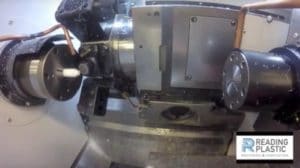
Prototyping is a necessary stage of product development that determines whether your production efforts will ultimately be successful or not. With the increased popularity of rapid prototyping, it is easier and more affordable than ever to produce plastic prototypes. When choosing how to create a plastic prototype, the two most popular options are additive processing (a.k.a 3D-printing) and CNC machining. While additive processing is beneficial for the “fit and feel” stage of prototyping, CNC machining allows you to test the functionality of the end-use product. Compared to additive processing, CNC machining offers tight tolerances, greater potential for threads and undercuts, reduced size limitations, and better surface finishes. In fact, CNC machining is the most accurate process for producing most 3D features.
How to Create a Plastic Prototype With CNC Machining
- Select a plastic – Choosing the right material is essential to a successful product. You want to be sure your prototype can succeed under test conditions, whether it’s extreme heat, chemical exposure, or heavy loads. One of the advantages CNC machining has over 3D printing is the ability to produce plastic prototypes from even the most advanced specialty plastics. At Reading Plastic, our expert staff can help you choose a plastic that meets the needs of your design and source the material for you. We work with virtually all plastic producers and are always adding new specialty plastics.
- Test your design – Tooling costs and production times are greatly reduced with CNC machining, which means your prototypes are delivered quickly and relatively inexpensively. Machining also makes it easy to tweak the design, allowing you to create multiple custom versions of your plastic prototype and test multiple designs at once, reducing the amount of time spent in development.
- Create a small production run – Producing a small batch of prototypes for focus group testing or trial runs is quick and cost-effective with machining. And you can continue to order small runs to avoid storage costs and overhead, or ramp up to large-scale production as demand increases.
The Benefits of CNC Machined Plastic Prototypes
- Better surface finishes – Injection molding and 3D-printing often have cosmetic defects or rough surfaces. CNC machining provides smooth finishes so your prototype looks and feels like the final product.
- Fully functional – With precisely flat mating faces and threaded holes, machined prototypes allow clients to experience your product as you intend it to be without being distracted by flaws created by the manufacturing process.
- Tight tolerances – Nothing beats CNC machining for close tolerances. Our process yields parts within .001 inches of the specifications. If your prototype must be as precise as possible to avoid inaccurate feedback during a testing period, machining is ideal.
If you need to create a plastic prototype, call us today at 610-926-3245. We look forward to turning your designs into a reality.
